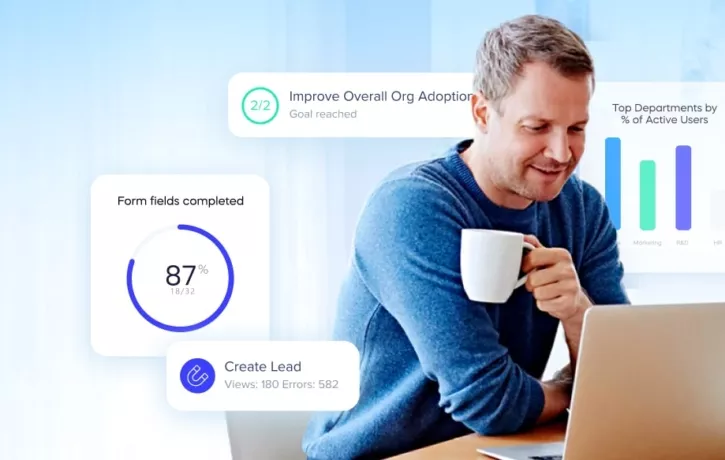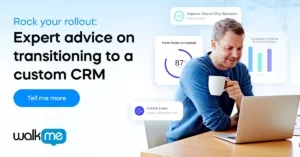Customer relationship management (CRM) software has quickly become one of the most important seller tools. And while the global CRM market is expected to reach $49.6 billion by 2025, it’s become increasingly clear that there are limits to how well a plug-and-play solution can cater to your unique business needs.
Transitioning to a custom CRM software can improve employee productivity while ensuring your sales team can interact with customers in a way that suits your specific business needs. Implementing such a change can only succeed, however, if you have buy-in from your team, so it’s imperative that your employees see the benefits and understand how the new CRM system works.
In this article, we will explore the benefits of custom CRM systems and direct you toward the next steps in your custom CRM journey.
Challenges and benefits of custom CRM systems
There are many benefits and challenges when it comes to customer relationship management systems.
CRM Challenges
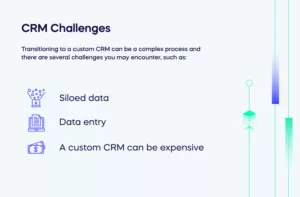
Transitioning to a custom CRM can be a complex process and there are several challenges you may encounter, such as:
Siloed data
The issue of siloed data is an unfortunate reality for many companies utilizing CRM software. This is commonly seen in cases when customers need to repeat themselves after being transferred to different departments, leaving them feeling frustrated and unheard.
To combat this problem and ensure seamless customer experience, it’s important that all departments use the same CRM platform with access to up-to-date client information.
Data entry
The CRM platforms used to store valuable customer information ultimately require time-consuming manual data entry. Agents who are constantly on-the-go may not have the time or resources for this task, making it an arduous challenge. But AI-enabled CRMs can automatically populate customer accounts from emails, texts and phone calls to simplify the process.
A custom CRM can be expensive
For businesses considering a CRM, one of the most daunting obstacles is cost. Implementing a solution too quickly or without preparation could become an expensive misstep. Consequently, it’s best to determine your business’s exact CRM needs in advance to formulate a clear budget.
CRM Benefits
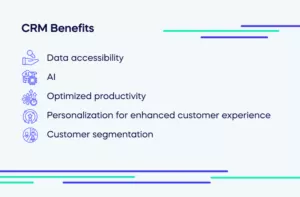
Despite the challenges, there are several benefits to having a custom CRM.
Data accessibility
Custom CRM software is a powerhouse when it comes to providing an organized, unified data system featuring comprehensive details about your customers. This makes it simple for employees across the company to quickly access necessary information — such as which products a particular customer may be interested in.
These solutions allow businesses to quickly and easily access records of past customer interactions. This feature not only saves employees from having to search through old documents but also creates better experiences for customers, as it enables personalized marketing efforts and sales pitches tailored to their prior engagements with the company.
AI
With an AI-driven CRM system, organizations can unlock a world of valuable insights. For instance, forecasting tools enable businesses to spot trends in customer data and provide sales agents with direction on what actions should be taken next. Additionally, sentiment analysis features detect the emotions associated with customer interactions – such as happiness or anger – allowing service personnel to understand how customers feel during conversations.
Optimized productivity
By integrating their CRM platform with other applications, such as calendar and electronic signature tools, organizations can easily streamline workflows. For example, an e-signature app enables customers’ information to be quickly pulled into forms – namely phone number, address, email and more – so that tedious manual data entry is no longer necessary.
Furthermore, CRM integrations make agents more efficient because they can access a range of tasks in one single interface. For instance, if the sales team links their CRM system with other applications like email and calendars, representatives could view customer interactions, upcoming appointments and pipelines from one location.
Personalization for enhanced customer experience
Organizations that prioritize customer experience (CX) can immensely benefit from personalized service and marketing driven by thoughtful segmentation of customers. By offering a tailored approach, custom CRMs increase satisfaction while boosting sales.
To achieve this, custom CRM platforms capture essential customer data, such as demographics, purchase history and customer service interactions, allowing marketers to target advertising more efficiently.
Customer segmentation
Compared to ready made CRM, custom CRMs allow more detailed features to segment customers into groups.
Customer segmentation analysis digs deep to bring a more detailed vision of the desired customer demographics. This type of understanding is invaluable for streamlining marketing, sales, product placement and even support services- all essential elements in any business enterprise.
By leveraging this methodical approach, companies are able to maximize their return on investment as well as obtain an edge over competitors. The world of customer segmentation analysis is vast and varied, encompassing multiple distinct types or categories:
- Behavioral
- Demographic
- Economic
- Industry/Vertical
Defining the long-term worth of a particular customer type helps organizations uncover their ideal patron profile. It also optimizes and refines services to both safeguard existing customers and augment lifetime value.
Now that we’ve covered the challenges and benefits of custom CRM systems, we can map out the next steps in your custom CRM journey.
Next steps in your custom CRM transition journey
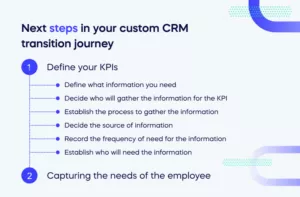
For the next steps in your custom CRM journey, it is essential to ensure that you measure its success. To achieve this, it is best to use KPIs (key performance indicators) and metrics to help employees see how the integration of the CRM is progressing and understand its use.
Your company’s success is ultimately determined by your employees’ experiences, making their satisfaction your most significant KPI. Without employee adoption, achieving ROI on your new custom CRM is impossible.
Define your KPIs
It is essential to define your KPIs to ensure all team members are working toward the same goal and customer service is consistent. To achieve this, follow these steps:
- Define what information you need
- Decide who will gather the information for the KPI
- Establish the process to gather the information
- Decide the source of information
- Record the frequency of need for the information
- Establish who will need the information
Capturing the needs of the employee
An essential element for digital adoption is the ability to capture both quantitative (number-based) and qualitative (experience based) success.
To make sure your digital adoption program is effectively delivering employee satisfaction, it’s imperative to include the voice of your team.
Management and employees often have disparate outlooks when assessing what constitutes a good CRM experience since the latter are usually more hands-on. To ensure that you meet and surpass objectives, incorporate feedback loops into the process such as on-call questionnaires or instantaneous post-call surveys. When you implement these tactics you are able to reach tangible success with your program.
CRM KPI examples
To ensure that your KPIs are tailored to the individual needs of your business, it’s important to measure critical actions and performance indicators. The data necessary for customer satisfaction is specific to each company; therefore, you must create measurements related directly to every touchpoint along their journey with you. Make sure that the number of metrics used adequately complements all aspects of customer experience without overwhelming them or adding too much administrative burden on yourself. To give a few examples, here are some KPIs businesses have utilized:
Useful KPIs
-
Sales conversions to leads
-
Funnel drop off rates
-
Average collection period
-
On-time delivery
-
Number of complaints per month
-
Cost per call
-
Time to first call response
-
Average time to problem resolution
-
Time to complete problem resolution
-
Call length
-
Number of lost opportunities
-
Email response rate
-
Monthly number of unconverted leads
-
Installation problems per unit sales
-
Email click-through rate
-
Volume of calls handled
-
Number of escalations
-
Customer ratings of service
-
Number of customer complaints
Invest in a DAP to support your custom CRM transition
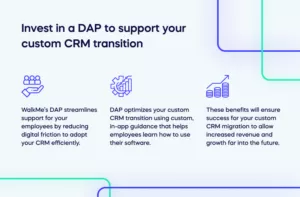
Custom CRMs allow your business to optimize and automate your sales process in a way that is specific to how you work and they are powerful tools that can give you a significant competitive advantage when implemented correctly.
One of the main challenges of a custom CRM is adoption, as employees struggle to use new technology or do not understand the need for it. WalkMe’s DAP streamlines support for your employees by reducing digital friction to adopt your CRM efficiently .
DAP optimizes your custom CRM transition using custom, in-app guidance that helps employees learn how to use their software. These benefits will ensure success for your custom CRM migration to allow increased revenue and growth far into the future.
